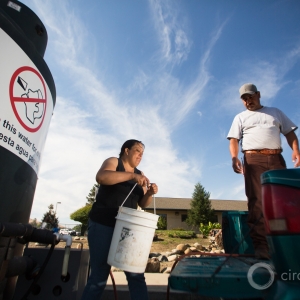The Stream, June 18, 2021: Study Finds Widespread Pesticide Contamination In German Streams
YOUR GLOBAL RUNDOWN
- A new study finds pesticide contamination in streams in Germany is widespread.
- In the United States, drought is diminishing hydropower generation in California, forcing ranchers in Colorado to sell off cattle, and contaminating water supplies in Iowa.
- Pakistan’s supreme court upheld the government’s decision to demolish thousands of homes blamed for flooding last year.
- Foreign ministers from more than a dozen Arab nations back calls for the United Nations Security Council to intervene in negotiations over a controversial Ethiopian dam.
A new report out of the UK calls on the government to improve the country’s climate adaptation plan.
“Adaptation remains the Cinderella of climate change, still sitting in rags by the stove: under-resourced, underfunded and often ignored.” – Baroness Brown, the chair of the UK’s climate change committee. The committee found that action to improve the country’s resilience to climate change was not keeping pace with the consequences from rising temperatures, the Guardian reports. The report highlighted the vulnerability of the power grid to flooding, storms, and insufficient cooling water. It noted the impact of future blackouts would be more severe with the increase in electric cars and home heating systems. The report also found that public safety and the natural environment are threatened if ecosystems cannot absorb carbon and soak up water to reduce flood risk.
IN RECENT WATER NEWS
As a Hot, Dry Summer Begins in California, More Water Wells Are Failing
In this blistering year in California drinking water wells are going dry in increasing numbers, rekindling memories of the historic drought of 2012 to 2016, when more than 2,600 wells across the state stopped producing water. So many wells went dry in 2014 in the town of East Porterville that Tulare County supplied portable public showers.
California is not yet to that level of emergency. A state database for household water supply issues received 38 dry well reports in the first 12 days of June, the most for any month since October 2016. But because the trend lines do not look promising, government agencies and nonprofit groups are preparing for a difficult summer in which thousands of wells could fail.
In Case You Missed It:
HotSpots H2O: Farmer-Herder Violence in Nigeria’s Middle Belt Persists, a Consequence of Drought and Climate Change – Nigeria’s central states, a region referred to as the Middle Belt, have been overwhelmed by violence for the better part of a decade.
Drought in the American West
Your need-to-know drought coverage for the week.
Drought In California Is Depleting Hydroelectricity Supply
The Sacramento Bee reports that the California Independent System Operator warned of potential power shortages throughout the weekend as the ongoing drought depletes the state’s supply of hydroelectricity. Compared to this time last year, California’s hydropower supplies are down 40 percent and conditions are set to worsen as reservoir levels continue to drop.
Drought, Toxic Algae Plaguing Iowa’s Waterways
Drinking water supplies for more than 500,000 residents in Iowa are being threatened by drought and burgeoning algal blooms, E&E News reports. Des Moines Water Works has asked customers to voluntarily cut their lawn watering by 25 percent amid a worsening drought, record heat, and a near-record demand for water. The water utility has been forced to rely solely on the Raccoon River because the Des Moines River is showing signs of toxicity from algal blooms. Officials will be keeping an eye on water levels in the Raccoon River, which is likely to drop through the summer.
Colorado Ranchers Begin Selling Off Cattle To Survive Drought
Farmers and ranchers on the Western Slope are feeling the financial and emotional toll of extreme drought in three of the last four years, the Colorado Sun reports. Many have been forced to ship livestock to greener pastures or sell them as water supplies have been reduced to historically low levels or cut off completely.
TODAY’S TOP WATER STORIES, TOLD IN NUMBERS
81 PERCENT
A new study found that pesticides pollution exceeded federal standards in 81 percent of streams in 12 federal states in Germany. Scientists at the Helmholtz Centre for Environmental Research found that pesticides affect aquatic invertebrate communities at much lower concentrations than previously assumed.
8,000 HOMES
Pakistan’s supreme court backed the Sindh government’s plans to destroy at least 8,000 homes that were blamed for the Karachi floods in 2020, the Guardian reports. Civil society organizations pleaded with the court to stop the work, which began in February, claiming the houses weren’t responsible for the high waters. Pakistan’s largest English-language daily newspaper reported that the demolition will displace at least 100,000 people.
ON THE RADAR
After a meeting between 17 Arab countries, Al Jazeera reports that foreign ministers are backing calls for the United Nations Security Council to intervene in a long-running regional dispute over the Grand Ethiopian Renaissance dam. Egypt, Sudan, and Ethiopia have failed to negotiate terms to fill and operate the Nile River dam for over a decade. The countries have particularly disagreed on a mechanism to deal with future water disputes and how the river’s waters should be allocated during droughts.
Jane is a Communications Associate for Circle of Blue. She writes The Stream and has covered domestic and international water issues for Circle of Blue. She is a recent graduate of Grand Valley State University, where she studied Multimedia Journalism and Women, Gender and Sexuality Studies. During her time at Grand Valley, she was the host of the Community Service Learning Center podcast Be the Change. Currently based in Grand Rapids, Michigan, Jane enjoys listening to music, reading and spending time outdoors.






Leave a Reply
Want to join the discussion?Feel free to contribute!